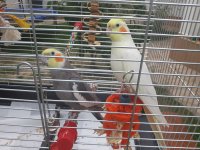dumpling98
Walking the driveway
Hello. I own two cockatiels. A female that is at least 7 months old and a male that is at least 1 year old. They both live in the same cage.
Today I saw them mating for the first time. I have a few questions. I do not want babies. But I also don't want to separate them in different cages.
1) How often will a bonded pair lay eggs? For example they lay one clutch, I get rid of them when they lose interest. And then what? Will she try directly for another clutch or it happens only in spring/summer?
I did a little research by myself and this is the gist I got. please tell me if I got it right, or wrong.
- the hen will possibly lay her first egg after 2-3 weeks after the first mating. I have to wait until 4-5 eggs are laid, and then replace them with dummy eggs.
2) How do I know when they lose interest in the fake eggs and I can remove them?
- I have to curb their hormones by making them sleep 15 hours and not provide any material or nesting box.
3) Now that they mated for the first time, should I expect a change in their behaviour or not?
4) Is the calcium provided in Roundybush meintenence pellets enough for the female? If not, what should I provide?
5) If one day we decide to keep 1 egg to grow into a baby chick, how do we do it? Wait untill the clutch is laid (expect all of them to be fertile), switch all eggs but one with fakes, and provide nesting box? And the parrots will know what to do, right? If we ever decide to keep a baby, we don't want to interviene, because we know nothing of breeding (but we would love to add a 3rd cockatiel eventually to the flock, so why not their kid) , so can I count on the pair to raise the baby parrot?
- I also read that I should weight the hen to predict when the egg will come? How much will she gain in weight aprox? If someone knows?
- I also read that just because they are fricking, it doesn't mean the female will produce an egg. Most sites I checked told me that if I put them under drastic hormone hindering routine, even after they mated they might not produce the egg. Is it true? Unfortunatly I am going on vacation for one week and my birbs will have alll the time in the world to enjoy themselves while the pet sitter only comes once a day to feed and change their bedding. So I can not really apply the hormon control right now, but it is really valuable information for the future.
Thank you for reading and thank you for helping!
Today I saw them mating for the first time. I have a few questions. I do not want babies. But I also don't want to separate them in different cages.
1) How often will a bonded pair lay eggs? For example they lay one clutch, I get rid of them when they lose interest. And then what? Will she try directly for another clutch or it happens only in spring/summer?
I did a little research by myself and this is the gist I got. please tell me if I got it right, or wrong.
- the hen will possibly lay her first egg after 2-3 weeks after the first mating. I have to wait until 4-5 eggs are laid, and then replace them with dummy eggs.
2) How do I know when they lose interest in the fake eggs and I can remove them?
- I have to curb their hormones by making them sleep 15 hours and not provide any material or nesting box.
3) Now that they mated for the first time, should I expect a change in their behaviour or not?
4) Is the calcium provided in Roundybush meintenence pellets enough for the female? If not, what should I provide?
5) If one day we decide to keep 1 egg to grow into a baby chick, how do we do it? Wait untill the clutch is laid (expect all of them to be fertile), switch all eggs but one with fakes, and provide nesting box? And the parrots will know what to do, right? If we ever decide to keep a baby, we don't want to interviene, because we know nothing of breeding (but we would love to add a 3rd cockatiel eventually to the flock, so why not their kid) , so can I count on the pair to raise the baby parrot?
- I also read that I should weight the hen to predict when the egg will come? How much will she gain in weight aprox? If someone knows?
- I also read that just because they are fricking, it doesn't mean the female will produce an egg. Most sites I checked told me that if I put them under drastic hormone hindering routine, even after they mated they might not produce the egg. Is it true? Unfortunatly I am going on vacation for one week and my birbs will have alll the time in the world to enjoy themselves while the pet sitter only comes once a day to feed and change their bedding. So I can not really apply the hormon control right now, but it is really valuable information for the future.
Thank you for reading and thank you for helping!

 . Do you have pics of your beautiful tiels?
. Do you have pics of your beautiful tiels?
 That little sweetie
That little sweetie
